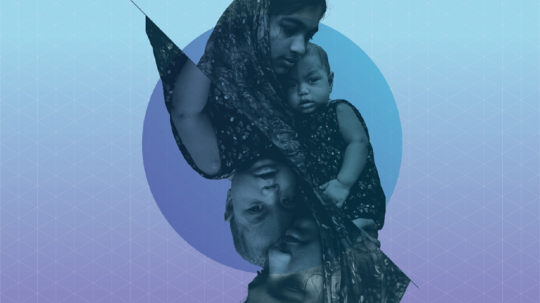Below Surface of A Global Pandemic
Subhendu Pratihari | 25 November 2021
For nearly two years, people in every corner of the world have survived countless impacts of the Covid-19 pandemic. More than five million people have lost their lives. Health systems have been overwhelmed and started to bounce back. But much more needs to be done to address the social and economic impacts of Covid-19.
Across Asia, hundreds of millions have lost income due to lockdowns, businesses folding and local economies grinding to a halt. Livelihoods have been shattered, mental health issues exacerbated and education suspended for long periods.
We need to look below the surface to see the full extent of the social and economic impacts of the pandemic.Inequalities have skyrocketed. We must help families recover and rebuild together by investing in community-led solutions. If not, social and economic harms will continue to be felt for many years.
The scale of the crisis is beyond anything most of us have seen in our lifetimes. This Covid-19 pandemic has sparked the deepest economic recession in close to 100 years according to the Organisation for Economic Cooperation and Development.
After 30 years of big reductions in poverty, recent Asian Development Bank figures show that up to 80 million people have been pushed in to extreme poverty across Asia, due to the COVID-19 pandemic.
Somehow, migrant labourers, informal sector workers and women small producers have to try to survive on less than $1.90 (62.5 baht) a day.
New research by the International Federation of Red Cross Red Crescent Societies (IFRC) reveals that the global socioeconomic impact of Covid-19 has disproportionately affected women, people in urban areas and migrants, internally displaced people and refugees.
Millions of women have still been expected to run their households, while managing the extra burden of caring for extended family infected with Covid-19. Women have been at higher risk of infection as carers while working in risky daily-wage jobs.
Lockdowns and the resulting social isolation has exposed women to increased sexual and gender-based violence, often in their own families. It is shocking, though not surprising that the research indicates that women are experiencing serious mental health impacts to a greater degree than men.
Poverty rates in urban areas have grown, in some cases at a faster pace than in rural areas. In Afghanistan, poverty in urban areas escalated to 45.5% in 2019-20 and reached 55.2% in the initial lockdown period.
In the Philippines, the IFRC research shows that people most impacted, are daily wage earners including vendors and factory workers. People working in transport, food and the beauty industry have also suffered huge loss of livelihoods and income. Workers in many countries across Asia from Indonesia to India have suffered the same fate.
The study finds that people on the move are more likely to lose jobs. In countries including Philippines, Nepal and Myanmar, the pandemic's impact on migrant-workers has triggered devastating impacts elsewhere in the world as much-needed funds have no longer been sent to their home countries.
The severe impacts and scale of the pandemic will continue to affect us all for years to come. To help people rebuild their lives we need to urgently shift focus and address longer-term economic and social recovery for people worst affected by this pandemic.
This is a huge opportunity to invest in fairer societies while tackling the growing risks from climate change. We need greater investment in inclusive public services such as healthcare, skills development and livelihoods, along with access to all types of education for children and young adults.
We can invest more in enriching and protecting communities, creating jobs and industries that eliminate climate emissions and reduce the devastating risks from disasters. Measures are already underway in Thailand, Vietnam, the Philippines and across Asia but much more action is needed.
We must help strengthen resilience in families already made vulnerable by having communities determine solutions. People from flood and typhoon-prone villages need to have a say in determining safer and more sustainable futures.
Yet ongoing global inequity of access to Covid-19 vaccines is threatening the economic recovery of many countries in Asia. The wealthiest countries have stockpiled vaccines, immunising their population faster, claiming victory for their recovery over the pandemic.
Canada has purchased up to 11 vaccine doses per person. Europe has procured around seven per person according to the Duke University's Vaccine Launch and Scale Speedometer. Whereas some countries in Asia have fully vaccinated less than 25% of their populations, stifling social and economic recovery.
Greater efforts are needed to achieve global and equitable vaccination rollouts, so that all countries can make progress on their social and economic recoveries.
We need much greater investment in healthcare. Continued public health measures such as mask-wearing and testing are more important than ever.
Covid-19 has wrought immense social and economic impacts. Yet we're only scratching the surface on the sheer scale of the challenges ahead. This pandemic of a lifetime comes with unique opportunities to invest in reducing poverty and hardships, putting Asia back on track for a more sustainable, fair future.
Subhendu Pratihari is Livelihoods Coordinator at International Federation of Red Crescent and Red Crescent Societies.
This article was originally published on Bangkok Post.
Views in this article are author’s own and do not necessarily reflect CGS policy.
